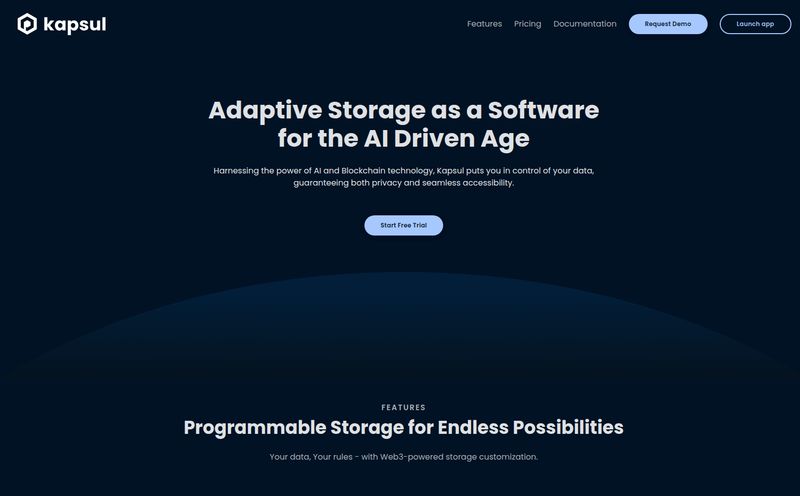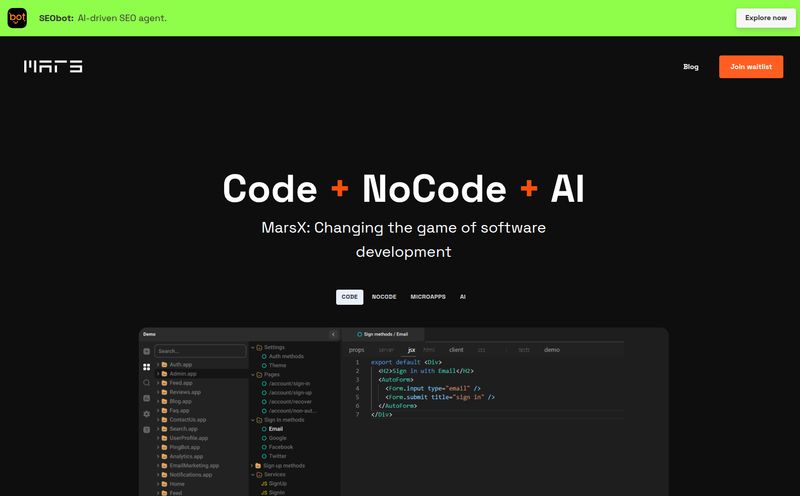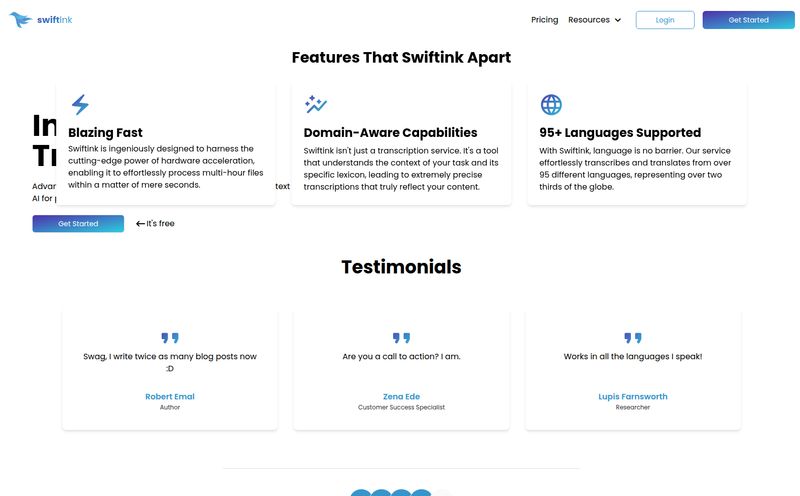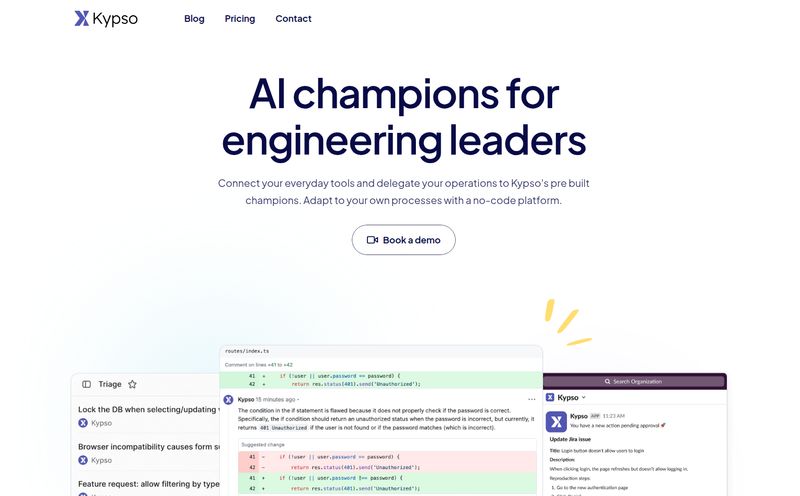The AI gold rush is in full swing, and it feels like every startup, every marketer, every kid in their dorm room is trying to stake a claim. But here’s the thing they don't always mention in the flashy headlines: building with AI can be a serious pain. I mean, a real, pull-your-hair-out, why-won't-this-stupid-authentication-token-work kind of pain.
I’ve spent more years than I’d like to admit wrestling with APIs, trying to get different systems to talk to each other. It’s often a mess of documentation, obscure error codes and endless testing. Now, you take that and add the layers of a massive language model on top? It's a whole new level of complexity.
So when a tool like Props AI pops up on my radar, promising to let you build complex AI APIs with a simple point-and-click interface, my inner skeptic and my inner optimist get into a fistfight. The optimist is screaming, “Finally!” The skeptic is muttering, “Yeah, right.”
So, which one is it? Let's take a look.
What Exactly is Props AI Anyway?
At its core, Props AI is a low-code platform designed to bridge the gap between a great idea and a functional AI-powered application. Think of it less like building a skyscraper from scratch and more like using super-advanced, intelligent LEGO bricks.
The whole process sounds almost too simple. You go in, write a prompt for the AI—you know, something like “Write a catchy, three-word marketing slogan for a company that sells space-themed dog toys.” Then, you can add variables to that prompt. So instead of just dog toys, your application could send “cat sweaters” or “lizard leashes” to the same prompt, making it dynamic.
After you’ve crafted your prompt, you select a model (we’ll talk more about this later), and poof. Props AI spits out an API endpoint and a little snippet of code. You just copy and paste that into your app, and suddenly, you have a live AI feature. It's like an instant AI vending machine for developers and creators. The promise is an API endpoint, live and ready, in literal seconds.

Visit Props AI
The Big Wins: Why Props AI Catches My Eye
Okay, so the promise is big. But where does a tool like this actually make a difference? From my perspective, it boils down to two massive things.
Speed is the Name of the Game
In the world of online business, and especially in the startup scene, speed is everything. The ability to build a Minimum Viable Product (MVP) and test an idea before you sink thousands of dollars and hundreds of hours into it is critical. This is where Props AI could seriously shine. The idea of going from a concept for an AI feature to a working prototype in a single afternoon… that’s not just an improvement; it’s a total shift in workflow. It’s the difference between arguing about a feature in a meeting and actually showing a working version of it.
A Breath of Fresh Air for Non-Coders (and Overworked Coders)
Let's be honest. The term 'low-code' is catnip for marketers, founders, and project managers who have brilliant ideas but can’t write a line of Python to save their lives. A platform like this democratizes AI creation. But it's not just for them. I've worked with enough developers to know they'd often rather focus on the core, unique logic of their application than spend a day setting up boilerplate code for an AI API they might just be experimenting with. Props AI handles the boring part, letting them get straight to the fun stuff.
Let's Be Real: The Potential Bumps in the Road
Alright, let's let the skeptic have a turn. No tool is perfect, and platforms that promise ultimate simplicity often do so by hiding complexity. And sometimes, you really need to see that complexity. Based on the info out there, there are a few things that give me pause.
The 'Black Box' Model Problem
The documentation says you can “select a model,” but provides very little information on what those models are. Is it OpenAI’s GPT-3.5-Turbo? Is it the powerhouse GPT-4? Or maybe a fine-tuned open-source model like Llama 2? This isn’t a small detail. The choice of model impacts everything: the quality of the output, the cost-per-call, the speed, and the kind of tasks it’s good at. For me, this is a big question mark. If I'm building a serious app, I need to know what engine is under the hood.
The Golden Handcuffs of a Platform
When you build on a platform like Props AI, you are, by definition, reliant on it. You're building with their tools on their infrastructure. This is the classic SaaS tradeoff. You get speed and convenience, but you give up some control. What happens if the platform has an outage? Your AI feature goes down too. What if they pivot or change their pricing model drastically? You’re faced with a tough choice: pay up or rebuild. It’s something you just have to be aware of.
The Sign-Up Wall and Pricing Mystery
I get it, I really do. Forcing a sign-up to see all the features is a lead-generation tactic as old as the internet itself. But in 2024, transparency is a huge trust signal. The fact that I can't find a public pricing page is a little frustrating. I want to be able to quickly assess if a tool is within my budget without having to hand over my email and wait for a sales pitch. It makes it hard to compare Props AI to other solutions, like just using an API from OpenAI or Cohere directly.
Who is Props AI Actually For?
So, weighing the good and the not-so-good, who should be smashing that sign-up button?
- The Rapid Prototyper or Startup Founder: Absolutely. If you have an idea for an AI-powered app, this seems like one of the fastest ways to build a functional proof-of-concept and see if it has legs.
- Marketers and Agency Owners: I can see this being huge for building small, internal tools. Imagine an AI fine-tuned on your company’s blog posts to help generate social media content in the right brand voice. Quick, simple, effective.
- The Freelance Developer: Got a client who wants to “add some AI” to their website? This could be a fantastic way to deliver a cool feature quickly and profitably, without getting stuck in a development swamp.
Who might want to hold off? Probably anyone building a massive, enterprise-grade application where granular control over the AI model, uptime guarantees, and deep security audits are non-negotiable. At least for now.
A Quick Look at the Potential Props AI Pricing
Disclaimer: Since there is no public pricing page, the following is pure speculation based on industry standards for similar SaaS platforms.
If I were to guess, I'd expect a tiered model that looks something like this:
| Tier | Potential Price | Likely Features |
|---|---|---|
| Hobby / Free | Free | A limited number of API calls per month, for testing and personal projects. |
| Startup / Pro | $25 - $75 / month | A generous number of API calls, access to more powerful models, faster support. |
| Business / Enterprise | Custom Pricing | High-volume API calls, dedicated support, SLAs, custom integrations. |
Again, this is just a guess. You'll have to sign up to find out for sure.
Frequently Asked Questions about Props AI
- Is Props AI a no-code or low-code platform?
- It's best described as low-code. While the API creation is a no-code, point-and-click process, you still need to take the provided code snippet and implement it into your own application's codebase. So you need some technical ability, or a developer to help.
- Can I choose which AI model to use, like GPT-4?
- The information on this is currently limited. This lack of transparency is a potential downside for users who need a specific model for its capabilities or cost. You seem to be reliant on the platform's selection.
- How does Props AI compare to just using the OpenAI API directly?
- Think of it as speed vs. control. Using the OpenAI API directly gives you total control over every parameter, but requires more setup, code, and management. Props AI abstracts all that away for you, giving you an endpoint much faster, but with fewer customization options.
- Is Props AI suitable for building a large-scale commercial application?
- Right now, it seems perfectly suited for MVPs, internal tools, and smaller-scale applications. For a massive, mission-critical commercial app, the unanswered questions around scalability, model choice, and platform dependency would need to be addressed first.
- What happens to my API if Props AI has an outage?
- Since your API is hosted on their platform, your API endpoint would almost certainly go down if they have an outage. This dependency is a key consideration for any production application.
My Final Take: Is Props AI Worth a Shot?
So, who won the fight between my inner optimist and skeptic? I'd call it a draw, leaning towards the optimist.
I’m genuinely excited by tools like Props AI. The future of tech isn't just about more powerful tools, but more accessible ones. Anything that lowers the barrier to creation and allows more people to build their ideas is a win in my book. The platform and it's focus on speed is a huge selling point.
The core tradeoff is clear: you're swapping granular control for incredible speed. For many, thats a trade worth making every single day. The questions around model choice and pricing are real, but they don't erase the massive potential here for the right kind of user.
In my experience, the best way to know for sure is to try it. For rapid prototyping or adding a simple, clever AI feature to a project, Props AI looks like a fantastic contender. It might just be the shortcut you need to bring your next big idea to life. If you give it a spin, I'd love to hear what you build.
Reference and Sources
- Props AI Official Website: (A link to the official Props AI website would be placed here)
- Forbes Article: The Rise Of The API Economy And What It Means For Your Business
- TechCrunch Article: The low-code/no-code boom is here



